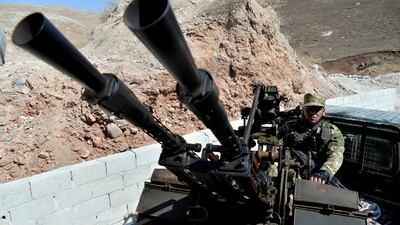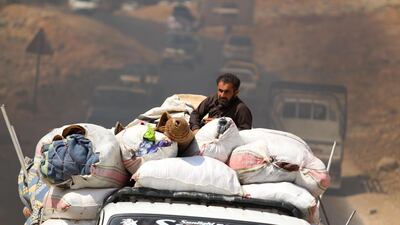Turkish President Recep Tayyip Erdogan on Tuesday warned that the entire international community would pay the price if they failed to avert a "humanitarian disaster" in Syria’s Idlib as the regime and its allies gear up for a major offensive.
In the article for the Wall Street Journal, Mr Erdogan called on the international community to take action, and warned that "the entire world stands to pay the price".
"All members of the international community must understand their responsibilities as the assault on Idlib looms. The consequences of inaction are immense," Erdogan said.
"A regime assault would also create serious humanitarian and security risks for Turkey, the rest of Europe and beyond."
Both Turkey and Europe beyond given the potential for massive exodus of refugees fleeing the bloody fighting in northeastern Syria.
Mr Erdogan has called for a ceasefire in the Idlib, the last rebel stronghold in Syria, as an assault by Syrian government forces is expected any day. However, Russian President Vladimir Putin has said a ceasefire would be pointless as it would not involve the militant groups deemed as terrorists. Iranian president Mr Rouhani said Syria must regain control over all its territory.
The Turkish president said the West had an "obligation to stop the next bloodshed" but that regime allies Moscow and Tehran were "likewise responsible for stopping this humanitarian disaster".
The comments came four days after the Turkish president met his Russian and Iranian counterparts for a summit in Tehran, where Erdogan sought to avert a bloody assault in Idlib.
Analysts said Mr Erdogan failed at the summit to achieve his aim, and his comments appear to indicate growing frustration in Turkey that Iran and Russia are not reining in Assad.
While Turkey has been one of the main supporters of Syrians rebels and called for Assad's ouster, Ankara has until now worked closely with allies of Damascus, Moscow and Tehran, to find a political solution to the conflict. Tehran and Moscow helped Mr Assad to turn the course of the war against an array of opponents, ranging from western-backed rebels to militants, while Turkey is a leading opposition supporter and also has troops in the country.
_______________
Read more:
Bombings in Syria's Idlib drive more than 30,000 from their homes
Foreign fighters in Syria's Idlib face last stand
Assad regime hits Idlib hospitals, first responders as latest Syrian offensive looms
_______________
The UN has warned a large-scale military operation could create "the worst humanitarian catastrophe" of this century in a province home to some 3 million people - around half of them displaced from other parts of the country.
The Turkish leader also criticised Assad's bid to legitimise the fight in Idlib as a counter-terrorism operation.
"Innocent people must not be sacrificed in the name of fighting terrorism," he wrote.
Idlib's most powerful armed faction is the Hayat Tahrir al-Sham (HTS) jihadist group, which Ankara officially designated a "terrorist" group last month.
Mr Erdogan acknowledged that groups like HTS "remain active in this area" but insisted that such fighters "account for a fraction of Idlib's population."
He called for a "comprehensive international counter-terrorism operation" and said that the assistance of pro-Ankara moderate rebels will be "crucial" in Idlib.
The civil war has claimed some 350,000 lives since 2011.
Turkish defence minister Hulusi Akar said on Monday that air and ground attacks on Idlib in Syria must stop, and a ceasefire must be established.
“Our most important effort is towards stopping all air and ground attacks on Idlib immediately and establishing a ceasefire and stability in the region,” Mr Akar told broadcaster NTV.
Turkey, which hosts 3.5 million refugees, also said it could not accommodate any more migrants if an attack on Idlib caused a new surge of refugees towards its border.
At the same time, high-level diplomats from Iran, Russia and Turkey were meeting in Geneva on Tuesday with the UN envoy for Syria about creating a committee to revise the war-battered country's constitution.
Hossein Jaberi Ansari, a special envoy for Iran's foreign minister, said a "good result" could emerge from the talks.
Asked whether Iran shared concerns about a possible humanitarian catastrophe in Idlib, Jaberi Ansari replied: "We are worried too. We are trying to avoid this."
Russian President Vladimir Putin's special envoy for Syria, Alexander Lavrentiev, declined to answer a question on his way into the talks about whether Russia would stop its airstrikes.
Mr De Mistura met informally with members of the three delegations on Monday.
The talks are set to focus on creating a constitutional committee under Syria's Russian- and Iranian-backed government. Russia, Turkey and Iran have been working together as "guarantors" for a series of talks around ending Syria's war.
On Monday, airstrikes on Idlib and Hama provinces forced some people to flee their homes, according to the Britain-based Syrian Observatory for Human Rights (SOHR).
The observatory also reported that 21 pro-government gunmen have been killed in clashes with ISIS in southern Syria.
The SOHR says the fighters died in clashes with the militants Monday night in the Safaa region in the Syrian desert.
Government forces backed by local and regional militias have been battling the militants for weeks in the countryside north of Sweida since the militants ambushed the city and its environs in July.
The militants are holding some 30 civilians captive since kidnapping them in the assault. They are believed to be holding them in the Safaa area.

















